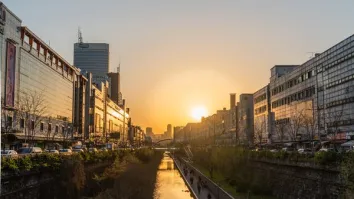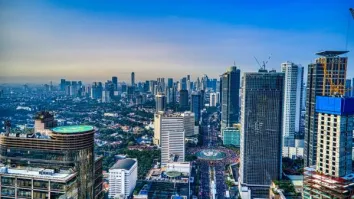
James Allan joins panel of judges at this year’s Real Estate Asia Awards
For JLL Indonesia’s Country Head, sustainability is becoming one of the most valued features in real estate.
James Allan is Country Head for JLL in Indonesia based in Jakarta. Over the 15 years that he has been with JLL, he has held numerous leadership positions, such as the Head of Office Leasing for Shanghai. James has played a key role in the success of the company’s commercial leasing business, both in a leadership capacity and his involvement in numerous high profile transactions and landlord projects.
James has over 20 years real estate experience and started his career with DTZ based in London. He relocated to China in 2006 to take up a leadership position in the commercial office leasing team. His experience includes commercial leasing, residential investment and development and advising multinational investors and companies. Some of the clients he has represented include Goldman Sachs, Credit Suisse, Deutsche Bank, WPP, KPMG, Warburg Pincus, Wells Fargo and Fidelity.
As one of the judges of Real Estate Asia Awards 2021, James sat down with us to share his insights about what the workplace of the future looks like, how the pandemic has impacted the growth of real estate, why climate change matters, and how landlords can stay relevant even during the crisis.
What do you think is the most important factor when judging real estate developments for the Real Estate Asia awards
The most important factor is being able to provide a detailed overview of the design, structure, environmental impact and function of the building as well as developments that capture new concepts. This ensures it remains timeless and relevant to users and the community.
What can the real estate industry learn from the COVID-19 crisis? And for those who have been badly hit, what can owners do to jumpstart their recovery?
COVID-19 has really been a game changer for many industries, real estate included. The pandemic has impacted the growth of e-commerce, the rise of co-working and flex space, and evolving consumer demands, while pressures such as working from home, same-day food and product delivery, and social distancing have accelerated the impact of some of these trends.
To stay relevant, attract tenants and meet their changing needs, landlords have to be increasingly aware of the need to enhance their built assets, driven by the accelerated demands for health and wellness features, enhanced human experience, sustainability and technology tools following the pandemic.
What are the challenges and opportunities in the real estate industry today?
According to JLL’s latest research, rental rates for aged and outdated buildings are 10% to 40% lower than up-to-date, well-managed properties in similar locations across Asia Pacific. This marked difference in rates may also increase as newer post-pandemic designed buildings enter the market.
Furthermore, older buildings’ energy and maintenance systems are often less efficient, leading to increased operating costs. For older buildings, this presents a unique opportunity to accommodate the demands of developing end-users and tap into the secular trends occurring regionally.
Which trends will define the real estate industry in the years to come?
With climate change being more front of mind for many businesses, sustainability is becoming one of the most valued features in real estate. There is an urgent need for efficient, sustainable buildings in livable cities to house rising urban populations, particularly in the emerging markets of Asia-Pacific, which are poised to need more real estate for people and businesses alike. Indonesia will have 68% of its population living in towns and cities by 2025, and its cities are growing an average of 4.1% annually, according to data from the World Bank.
In addition, data analytics, artificial intelligence, the Internet of Things, virtual reality, blockchain – all of these will have significant repercussions for how we invest in and occupy real estate in the future. And there is a great deal of potential for proptech in Asia Pacific. With its young population, rapid urbanization and ‘mobile first’ mindset, all the conditions are in place for this new sector to accelerate.
How important is leadership in helping real estate businesses survive pandemic?
As organisations embrace the future of work as a result of the pandemic, employers should be looking to provide a safe and healthy environment for employees while trying to bring out their best productivity levels. This could be allowing them the flexibility to work in the way that suits them best, designing the ideal setting for creativity and innovation, creating a human work environment that promotes open and caring relationships, and cultivating a sense of community with common purpose and vision. The workplace of the future will need to be employee-centric and offer wellness, fulfilment, freedom and choice.
What do you think is the future of real estate in Asia and the world?
Landlords across the region became much more accommodative with many increasing incentives in order to stimulate demand. Recovery in demand and rents heavily dependent on the timing and efficacy of vaccination programs regionally and globally. We are cautiously optimistic that markets will stabilise in 2021 and conditions will improve starting from 2022.



















 Advertise
Advertise





